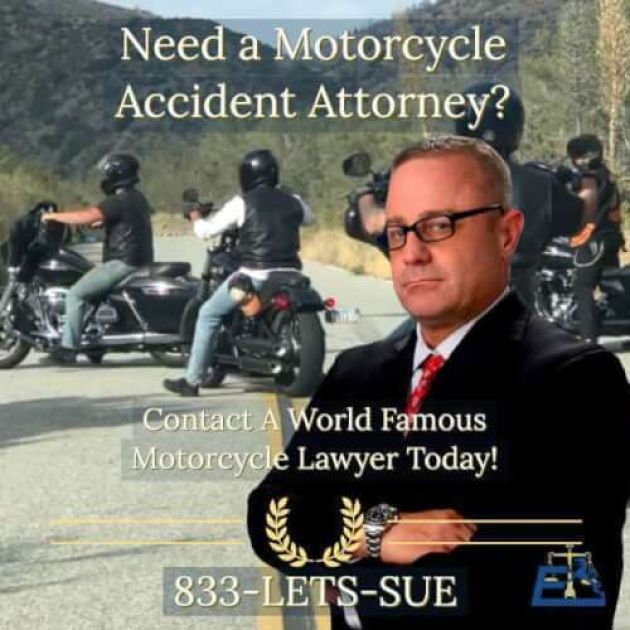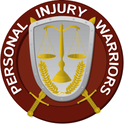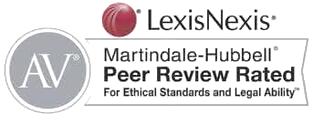




Motorcycle Crash?

Legal Support for Motorcycle Accident Victims Across California.
Los Angeles and its pristine views offer motorcyclists a vast amount of liberty. Sadly, this freedom, including get-back whips, can lead to disastrous ramifications if they are involved in a motorcycle accident or police contact.
“Client: Oh nice to meet you.
Attorney: Hey nice to meet you too. You know, I was going over your file, and looks like you were driving a brand new Gold-wing along a pretty dangerous stretch of Mulholland and it looks like you got in a wreck right where I’ve already had a few close calls. You know cars really just don’t look out for us bikers do they?
Client: No, they don’t the police report is placing their client at fault.
Legal Secretary: The police report is placing our client at fault.
Lawyer: Well I’m convinced we can overcome the bias in that police report. You know the two witnesses the police didn’t interview? Well, we found them and we got their statements. You know what, they corroborate everything he [client] says. Let’s go ahead and get this lawsuit filed right away.
Client: My other attorneys never tried to find witnesses.
Paralegal: Well our firm is very different.
Attorney: Yeah we’re a lot different.
Client: How am I gonna pay these medical bills?
Attorney: You know what? Let me worry about that! Let’s get you the compensation you deserve.
At Ehline Law Firm we don’t just want your case, we want your confidence. At Ehline Law Firm, we make it happen.”
A motorcyclist accident might result in catastrophic injuries and cost families a fortune.
Ehline Law fights justice on behalf of motorcycle injury victims in Greater Los Angeles and throughout the entire State of California. Their compassionate and aggressive team will work to ensure you receive the maximum financial compensation you are entitled to under California law Don’t go it alone!
These premier advocates never charge motorcycle accident victims like you a fee unless you have a winning claim. Ehline Law has experience settling and litigating thousands of claims against every large insurance carrier and even some major Fortune 500 companies.




Common motorcycle accident injuries include anxiety, fatal motorcycle accidents, traumatic brain injuries, a spinal cord injury, painful road rash, broken bones, mental health decline, and life-long physical/emotional pain.
In terms of real dollars, lost wages, expensive surgeries, repair bills, and unpaid medical expenses can bankrupt victims and families after a tragic motor vehicle accident.
Since 2005, Ehline Law Firm in Los Angeles County has professionally helped injured clients with automobiles as a motorcycle accident law expert with thousands of motorcycle accident claims.
They have the know-how and expertise to brief the strongest arguments and may file a lawsuit right away to conduct legal discovery.
They will explain each of your legal options, supervise a careful investigation of the accident, and, if needed, challenge the findings of the insurance carrier and police report. They will seek to establish fault by looking at road conditions and inspecting things like safety equipment and damaged vehicle.
Below their best motorcycle accident personal injury attorney will discuss how their top motorcycle accident attorney in Los Angeles will custom-tailor legal representation for each motorcycle rider.
They will also cover how you can secure compensation benefits from the at-fault driver. Call their Los Angeles personal injury lawyer office at (213) 596-9642 to speak with one of their attentive team members today.
Safeguard The Legal Process One Step At A Time
Our astonishing trial attorneys will present your case to an unbiased jury of your peers. Jurors will ultimately deliver a square deal to litigants. A jury must hear all the facts and deliberate evidence neutrally. But many leading egalitarians say righteous revenge is all a jury award conveys. However, the jury returning decides the accident’s verdict.
Go here for More Verdicts and Settlements
- $10,500,000
- $8,700,000
- $4,886,255.67
- $4,200,000
- $3,265,000
- $2,300,000
- $2,024,761
- $2,000,000
- $1,900,000
- $1,400,000
- $1,220,000
- $1,050,000
- $1,037,500
- $1,000,000
- $1,000,000
- $950,000
- $850,000
- $750,000
- $600,000
- Domain Saved
- Appeal From Denial of Anti-Slapp Motion
Confidential Settlement / Contra Costa County. Illegal U-Turn collision with a truck cut off the plaintiff’s motorcycle rider, causing serious spine, brain, and other injuries, including a coma.
Depend On Us For Your California Motorcycle Accident Claims
But what makes Ehline’s team different? What makes their client commitment better?
- Their Los Angeles motorcycle accident lawyers stick by your side. (They provide consultations and explain applicable law and the potential risk).
- They hold at-fault drivers accountable for paying compensation for their motorcycle accidents.
- They help foster a communicative, cheerful, trustworthy environment to improve the attorney-client relationship level.
- They use hard work and experience to overcome community and police bias in your motorcycle accident.
- They strategically employ their law group to navigate multiple local, state, and federal law areas.
- They will handle all auto accident claims with dedication.
- They do business on a no recovery, no contingency fee basis. (No win, no fee promise)
- They use experience, impeccable reputation, and proven track record of success to further justice.
- They generously support Southern California biker clubs and non-profit charity organizations’ needs.
How Can Aggressive Motorcycle Accident Lawyers In Los Angeles Help?
You and your loved one must understand no average settlement value exists for a motorcycle accident, especially after suffering a head injury or fatalities.
The best method of receiving accurate settlements for Los Angeles motorcycle accidents is hiring a talented, aggressive lawyer.
Here’s some information explaining how these lawyers offer help to fallen motorcycle riders build verdicts and settlements after motorcycle accidents with cars:
Case Evaluations And Evidence Gathering
Insurance companies escape liability for auto accidents by lulling claimants into not hiring help. The two-faced insurer will run out of the clock, hoping the motorcycle rider won’t locate witnesses, receive medical care, or receive vital legal assistance.
These villains promise you money if you’re “patient.” But how much is your case worth? Will your case yield a healthy verdict/result?
Ehline’s team wants to provide you with a free case evaluation. Assuming you retain their legal services, they’ll put investigators to work to assist the wounded rider, proving their burden of fault.
Experienced Personal Injury Attorneys Investigate Motorcycle Accidents in Los Angeles
These aggressive motorcycle lawyers will look for evidence of speeding automobiles, tailgating, lane splitting, unsafe lane changes, drugs, or alcohol consumption. Was someone texting, talking on a cell phone, eating, and weaving in and out of traffic?
They even investigate cannabis intoxication and will seek out info about dangerous road conditions.
Experienced Motorcycle Accident Lawyer Gathers Evidence
This office will gather data for the motorcycle accident victims, including available police reports from the police officer(s), witness statements, and weather reports. Their team will hunt down valuable surveillance tapes identifying debris patterns and loose motorcycle parts.
This information will help them pinpoint a defective part, an at-fault driver, threats, and more liable people, including their fault degree (s). Afterward, their legal team can evaluate a proper motorcyclist v. car crash case and identify people financially responsible for paying your personal injury claim.
Insurance Company Negotiations
Your motorcycle law experts will negotiate with the insurance company to ensure you receive fairer indemnification. They won’t let the insurers convince you to accept a lowball settlement offer as you struggle to get by after a severe auto collision.
If the insurance company fails to offer you a reasonably fair damages value calculation, these well-trained law offices can seek private mediation to break the stalemate.
If negotiations fail, they can advance costs for filing a Los Angeles Superior Court lawsuit near you, seeking better results for your motorcycle accident claims.
Familiar Negligent Parties And Causes of Los Angeles Motorcycle Collisions
California is an at-fault state. Identifying who and what caused your motorcycle accident claim remains a vital first step toward obtaining financial compensation. Unlike “no-fault jurisdictions,” the negligent defendant(s) must pay their share.
Victims of all no-fault Los Angeles motorcycle accidents are entitled to money for medical bills, repair or replacement parts, lost earnings, intangible pain and suffering damages, and losses.
Here are some of the most common causes of motorcycle accidents and liable defendants:
- An automobile driver.
- Distractions. Inverse visibility issues occur when inattentive drivers see only negative space around motorcyclists instead of the actual riders. A distracted driver of a private or public bus, truck, or passenger car making a left turn could knock you off your bike at high speed. A rear-end crash can also kill a biker.
- Illegal, reckless driving. Drivers must compensate you and your loved one for damages after breaking roadway rules. Texting, driving drunk, sudden stops, or road raging is illegal. Wrong-way driving, excessive road speeds, abrupt lane changes, and refusing to honor a rider’s right-of-way compound crashing risks. Negligent vehicle operators pulling into a cyclist’s path are the deadliest because the automobile’s point of impact is the front of your bike.
- An employer. Companies and government agencies have vicarious liability for bad employee acts causing motorcycle crashes.
- A poorly designed/defective road. Motorcyclists are susceptible to crashing on improperly maintained or defectively designed public roadways with poor conditions. Hazards include potholes, scattered debris fields left in parallel streets, and traffic lanes from storm drain runoff. Oil, mud, rubble, loose gravel, grass clippings, fallen tree branches, and animal carcasses cause crashes. Other severe risks to two-wheeled vehicles include running over a loose nail, screw, litter from an unsafe construction zone, or open utility hole cover grabbing your tire or wheel. You may have a negligent roadway maintenance dispute. Your lawyer may be able to pursue Caltrans, the County or City of Los Angeles, CA, or a private contractor.
- A defective product. Motorcycle designs cover daily commuting, long-distance travel, commuting, cruising, sporting, or off-road use. Sometimes, lousy motorcycle parts or other types of maddefectsbmakeunfit for use. The motorcycle manufacturer/equipment maker might be held accountable under product liability theories. (e.g., defective safety gear, bad helmets). Perhaps you crashed during motorcycle club (MC) formation riding? Maybe you experienced a brake failure, a pothole tire blowout, speed wobbles, or an electrical malfunction.
Compensation for motorcycle accidents is authorized by pursuing motorist negligence claims. (torts). But you will need a Los Angeles motorcycle accident attorney with experience.
You need dedicated lawyers who will hold people financially accountable for a motorcycle accident claim. Call Ehline’s premier attorneys 24/7 to get a free consultation on all motorcycle crashes in California and discuss the full extent of your injuries.
Common Injuries Motorcycle Accident Attorneys Take
Motorcycling social activities like joining a motorcycle club and attending motorcycle rallies help teach road hazard injury avoidance.
You can’t prevent all wrecks. No one can predict the severity of a motorbike collision, with its few safety features offering zero roll cage protection.
A motorcyclist collision in LA might quickly become life-altering and severe. Los Angeles County has America’s busiest streets, with more registered vehicles than many states.
According to the US Department of Transportation (USDOT): “Per vehicle mile traveled in 2007, motorcyclists were 37 times more likely than passenger car occupants to die in a motor vehicle traffic crash.” – US DOT
The most frequent injuries are to the toes, feet, legs, and ankles. Fatal injuries remain common after a motorcycle accident occurs.
The motorcycle crash lawyers at Ehline Law accept clients suffering all types of permanent, severe, catastrophic personal injuries:
- Traumatic brain injury (TBI) and mild traumatic brain injury (MTBI), including CTE Brain injuries
- Broken bones/fractures (a broken leg, hands, fingers, toes, ankles, etc.)
- Spinal cord injuries, including tetraplegia/paralysis
- Bruising, scarring, disfigurement
- Abrasions, cuts/lacerations
- Lower extremity damage
- Road rash/friction burns
- Internal organ damage
- Wrongful death claim
- Limb amputation
- Fractured skulls
- Rib fractures
- Avulsions
Survivors of serious accident motorcyclist wrecks may lose their careers since they can’t work. Survivors ensure long-term physical and psychological injuries as a consequence of crashing. Did you crash, suffer severe brain damage, post-traumatic stress disorder, coma, etc.?
Have you experienced a motorcycle wreck that involved a Los Angeles-area motorist? Working with a local Los Angeles motorcycle accident lawyer from Ehline gets you an expert.
These lawyers pressure the defendant to pay more for the victim’s injuries during the complicated claims process.
They help victims recover compensation, including money for physical pain and lost future earnings over the victim’s life.
California Helmet Law, Head Trauma, and Your Motorcycle Accident Case
Perhaps the most essential safety feature for your well-being is wearing reinforced headgear. California law requires motorcycle passengers, including all motorcyclists, to wear snugly helmeted helmets while riding.
Experts say wearing a federal DOT-approved helmet in compliance with California’s universal helmet law decreases motorcycle fatalities as well as serious injuries.
Your other limited security features include motorcyclist riding gear. Wearing heavy clothing, leathers, and heavy boots helps protect your limbs and lower extremities.
Consequences Of Failing To Wear Your Helmet
- Criminal-Counts/Infractions
If you refuse to wear your motorcycle helmet riding in California, you are breaking traffic laws. You potentially face a traffic fine, notice to appear citation, vehicle seizure, and license suspension.
- Civil-Helmet Defense
Helmet laws won’t automatically bar a victim from receiving intangible loss compensation. Just because you broke the law by leaving your head unprotected during a motorcycle wreck, other body parts get impacted, too.
A defendant may argue California’s pure comparative negligence law to shift your motorcycle accident claim blame. They’ll use this technique to offset eye, face, teeth, and head injuries payments.
- Pure Comparative Negligence – Failure to Wear A Helmet Defense
The other side’s medical expert testimony must show your wound would have been reduced/avoided but for your illegal failure to wear a helmet.
- Who Pays What
The court will instruct the jury to determine the motorcycle accident victim’s percentage of fault for inflating their injuries. If someone failed to wear head protection, causing 50% of their harm, they would recapture 50% less compensation. Your motorcycle accident lawyer at Ehline Law Firm fights to counter these defenses.
Bias – Who’s At Fault For A Motorcycle Accident Claim While Lane Splitting?
Since August 19th, 2016, California has been no longer neutral on motorcyclist lane splitting.
California’s lane-splitting law legalizes lane sharing. This maneuver involves a motorcyclist riding forward in between lanes in the direction of stopped or moving traffic flow.
- Distinguished From Illegal, Reckless Driving
Traffic expert studies show that correctly sharing lanes while riding motorcycles remains a safe transportation method. These professionals say lane sharing reduces road congestion and traffic accident cases.
Many police reports have unfairly blamed motorcyclists. Some cops automatically believe other biased motorists as the victim lays on the ground, unconscious in many personal injury cases.
Popular Motorcycle Collision Culture
Popular culture depicting the biker lifestyle created a controversial, pessimistic view of most bikers. Many drivers view lane splitting as inherently dangerous to surrounding vehicle operators, including motorcyclists.
Motorcyclists who recklessly lane split through motor vehicles at high speeds under unsafe conditions increase road dangers to others. This riding risk can make bikers comparatively liable for their entire crash.
If proof exists that you were driving too fast, making unsafe turns, weaving recklessly, and failing to obey traffic laws, you’ll get less or nothing. However, experts say most motorcyclists comply with California’s lane-splitting regulations.
You need to protect your financial recovery in complex lane-splitting accident claims. It would help if you got advice from a motorcycle accident lawyer in Los Angeles.
Compensation For All Your Los Angeles Motorcycle Accident Claims?
Depending on the party at fault or the type of injury claim, Ehline can get you money for a motorcycle accident injury claim. Did you suffer a catastrophic injury? Maybe you have a less extreme wound-like road rash?
Did factors out of your control cause your partial or complete impairment? Clients are entitled to totally fair compensation.
Clients deserve to know that their property repairs, along with fair compensation for their medical expenses, wage losses, and pain and suffering, are covered. Ehline will strive to win you long-term medical, psychological, and financial compensation.
Some Important Things About Motorcycle Injuries
- The most innovative way to understand your rights after a motorcycle accident depends on asking counsel questions during your consultation. When you receive your free consultation, the best Los Angeles motorcycle accident attorneys will thoughtfully answer your questions after such injuries.
This office’s well-trained Los Angeles personal injury attorney will assist the wounded motorcyclist.
They will investigate, documenting the following damages:
- Special Damages
- Disability-linked expenses (nursing care, specialized transport, etc.)
- Attorney’s fees, including out-of-pocket costs
- Past, present, and future medical bills
- Past, present, and future lost income
- Rental car/Uber-Lyft charges
- Bike repairs or replacement
General Damages
- Mental-emotional issues
- Pain and suffering
- Lost quality of life.
Punitive damages are awarded rarely. Although a minor motorcycle accident case doesn’t always cause severe, catastrophic injuries, it can cost more than a significant collision. A fatal accident tends to impact life more, making it worth more.
Talented motorcycle attorneys in Los Angeles find ways to settle your case after gathering reparations evidence, or they can let a qualified jury evaluate case information during the trial.
During the trial, a jury will decide on intangible/tangible harm by determining the plaintiff’s nature and extent of serious injuries.
This law group will help you receive a maximum financial recovery value for your severe motorcycle crash using proven negotiation tactics in your best interests.
What Is Your Motorcycle Accident Case Statute of Limitations in California?
When you seek compensation, time is of the essence! Depending on who’s at fault, plaintiffs must file their motorcycle accident cases before California’s statutory deadlines expire from injury discovery.
Motorcyclists must lodge a government demand within six months. Civil lawsuits must be filed within two years of motorcycle collisions unless an exception applies.
Generally, motorcyclists failing to bring a timely action for severe injury or a family member’s wrongful death are time-barred from pursuing future recovery. Once hired, your superlative, Los Angeles motorcycle accident attorneys will offer legal advice, calendar your dates, and protect the statute.
Their veteran partners/associates do more to speed up cases, streamlining the settlement process. They’ll gather evidence and identify at-fault drivers. They will meet the plaintiff’s car accident personal injury claim deadline.
Tips After A Motorcycling Accident in Los Angeles
The injured motorcyclist can take many innovative steps before hiring motorcycle accident lawyers in Los Angeles, CA, to protect their rights against the liable party.
- Find a safe haven. If capable, protect/shelter victims at the crash site or a nearby safer concrete barrier, shoulder, sidewalk, sidestreet, or alleyway.
- Give-get triage. Don’t worry about determining fault. You must get to a safe place, stabilize yourself, and then check on others with casualties, including the at-fault party.
- Dial 911.* Without admitting fault, riders should report any fatality, bodily injury, or property damage with more than $1,000 damage to the California Highway Patrol or a local city police station. *(Officers have no duty to protect a plaintiff, conduct a traffic collision investigation, or create an accident report).
- Request medical evacuation. Ask for helicopter or ambulance EMT assistance in cases involving severe wounds. Even if you think you weren’t hurt, you must get directly to urgent care, a hospital, or see your doctor. This care helps your riding injuries heal, preventing insurers from arguing you suffered other circumstances elsewhere.
- Move or cordon off your damaged bike. If you’re not physically disabled, you must move your motorcycle, including broken parts, from the street if you can’t try safely diverting motorists using emergency flares or hand signals, preventing further collisions.
- Obtain information. You must exchange financial responsibility (insurance policy number, agent contact phone number, etc.) information, identifying each other person.
- Snap photos. Taking iPhone images with your cell phone camera will geocode the location for later proof. Call a close friend or family member to snap pictures of a poor road or crashed bike, including the wreck scene area.
- Report motorcycle crashes to the insurance company. Generally, it would be best to never give statements to the at-fault party’s insurance representative before speaking to a lawyer. However, you should factually report your accident within 24 hours of the wreck without incriminating yourself.
- Treat medically until completion. You must follow your doctor’s orders, attend physical therapy, take your prescription drugs without treatment gaps, etc. Otherwise, the insurance company will ding you, claiming you exacerbated your injuries by not following your treatment regimen.
- Collect/preserve evidence. Gather accurate documentary records showing your liability/damages assertions are valid. This work can include securing your helmet for safekeeping, along with your riding gear and copies of your physical treatment medical expenses. Electronically storing iPhone/Android images for lawyer review helps win your case later.
- Contact your motorcycle accident attorney. Don’t ruin a strong case by opening your mouth. Before you speak with adjusters at insurance companies, get legal help from Ehline Law Firm Personal Injury Attorneys, APLC. Their staff has handled hundreds of torts. They can initially serve your needs, increasing your maximum compensation odds.
The insurer has expertise in engaging instances of deception, hindering your financial recoupment while optimizing insurance company profits. Retaining a motorcycle attorney from the beginning will increase your chances of winning a higher recovery.
An accident victim deserves the best representation with charisma and skill, not insurance company obstacles. These professionals are tier-one. They will carefully negotiate a risk with insurers, refusing to accept a lowball settlement offer on behalf of clients.
They understand the peculiar dynamics of being struck or ejected riding a motorbike. Before your motorcycle crash claim gets too far, you must hire a team near you to protect your rights.
Their best Los Angeles motorcycle accident attorney will handle the entire settlement process.
Schedule a Free Consultation About Your Case With A Motorcycle Accident Lawyer in Los Angeles
Speak immediately with a lawyer for a motorcycle accident in Los Angeles from Ehline’s highly experienced law offices today about your unique accident claim problems for help.
Victims of devastating motorcycle accidents in Los Angeles, CA, can request a free case review and free consultation with our law offices; call us 24 hours per day.
In addition, choosing our legal services means we will collect no payment unless we win your California contingency case. Any injured motorcycle rider can use our online intake form for faster turnaround times during this difficult time.
The answers you need for questions about all types of motorcycle wrecks are a phone call away. Call our office today and speak with a listening, trustworthy injury law advocate for a free consultation at (213) 596-9642.

Michael Ehline
Michael Ehline is an inactive U.S. Marine and world famous legal historian. Michael helped draft the Cruise Ship Safety Act and has won some of the largest motorcycle accident settlements in U.S. History. Together with his legal team, Michael and the Ehline Law Firm collect damages on behalf of clients. We pride ourselves in being available to answer your most pressing and difficult questions 24/7. We are proud sponsors of the Paul Ehline Memorial Motorcycle Ride, and a Service Disabled Veteran Operated Business. (SDVOB.) We are ready to fight.




